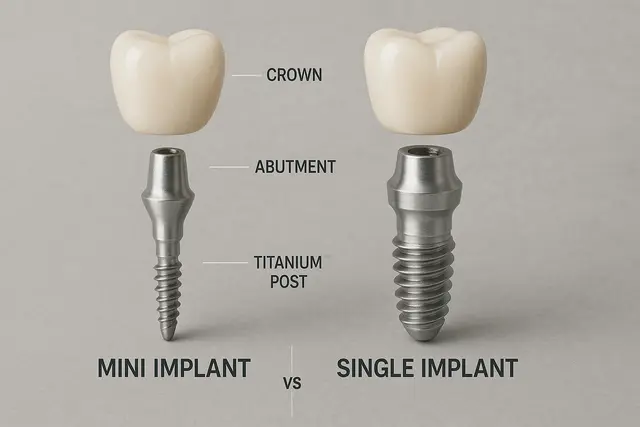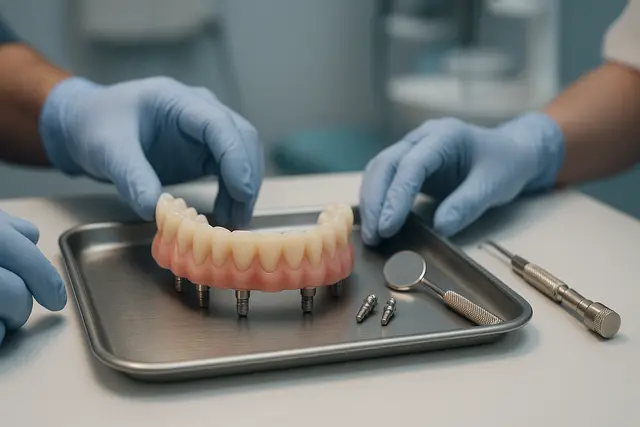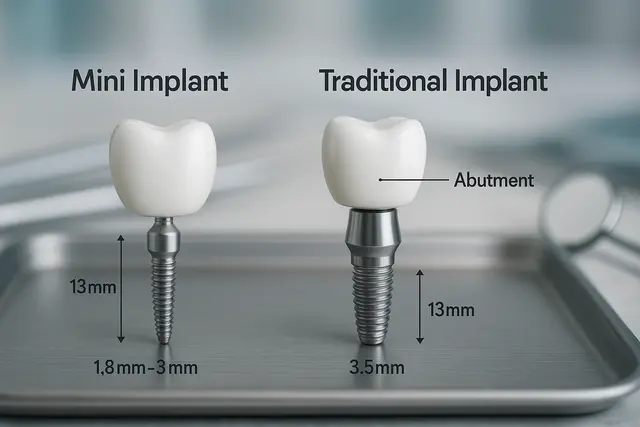Prosthodontics
6 min read
Jun 02, 2025
Realistic Expectations for Day 3 After Immediate Dentures
Getting immediate dentures is a big step, and day three is when the reality of that decision really starts to set in. If you’re feeling sore, swollen, or just wondering if everything you’re experiencing is normal, you’re not alone.

If you’re reading this with swollen cheeks and a milkshake in hand, welcome. You’re on day 3 after immediate dentures, which means you’ve survived the first 72 hours, and you’re still smiling (even if it’s a little puffy). The journey of getting immediate dentures is filled with ups, downs, and mushy meals, but day three is when reality starts to hit a little harder, and that’s perfectly normal.
Let’s break down what you can realistically expect on the third day, how your gums are holding up, and what to do to make this process more bearable and, yes, successful.
What Are Immediate Dentures and Why Day 3 Is a Big Deal
Immediate dentures are placed in your mouth right after your tooth extraction. Unlike traditional dentures that come in after everything’s healed, these go in fresh, so they’re sitting on top of gums that are still healing. While the idea is convenient (no walking around with missing teeth), the reality takes some adjusting.
By day three, you’re likely dealing with some swelling, tenderness, and the beginning of the true adjustment period. It’s not just about how dentures feel in your mouth, it’s about how your whole mouth, body, and routine respond to them.
The Third Day: What Your Mouth Is Telling You
The swelling on day three? Still very real. If your cheeks are puffier than you'd like and your gums feel like they’ve been to battle, don’t worry, it’s part of the healing process. Immediate dentures are sitting directly on areas that experienced trauma during the extraction, so discomfort and soreness are expected. In fact, the pressure from your denture may help reduce swelling a bit, but it can also cause irritation at the same time. Confusing? Welcome to day three.
You might feel like your dentures are pressing too hard or even feel loose. It’s not you, it’s the swelling shifting, your gum tissue adjusting, and your mouth figuring out this new normal. If your dentures feel loose or uneven, resist the urge to fix it yourself. Just jot down what you’re feeling and save it for your next check-in. Your dentist can make any necessary adjustments to improve comfort and fit.
Eating on Day 3: Soft Foods Are Still Your Best Friends
Let’s talk food. If you’re dreaming of steak or crunchy tacos, hit pause. You’re still in mashed potatoes territory. Stick to soft foods like applesauce, scrambled eggs, cottage cheese, or well-cooked pasta. Chewing too much too soon can delay healing and cause pain.
Getting immediate dentures means learning how to chew again, and that doesn’t happen overnight. Try chewing on both sides evenly and avoid hard, sticky foods. This isn’t forever, but for now, it’s part of the healing process.
And don’t forget to drink plenty of water. Staying hydrated helps reduce swelling and keeps your mouth fresh, especially since food particles can get trapped under the denture. Gross? A little. Manageable? Absolutely.
How to Care for Your Dentures on Day 3
Dentures aren’t just set-it-and-forget-it. Day three is a good time to establish your denture care habits. Clean your dentures daily to remove food particles and bacteria. Use a soft denture brush and a non-abrasive cleaner. If you're not sure what counts as "non-abrasive," your pharmacist or dentist can help you pick a gentle denture cleaner that won’t scratch the surface of your new set of teeth.
You’ll likely need to remove them for cleaning, but your dentist might still recommend wearing them most of the day, yes, even overnight at this stage, to help control swelling and keep your dentures in place. Always follow your post-operative instructions, and if you're not sure whether to remove your dentures overnight just yet, contact your dentist for guidance.
Pro tip: rinse your mouth with warm salt water (about a teaspoon of salt in a glass of warm water) three to four times a day. This helps reduce swelling, soothes the gums, and supports your oral health without harsh chemicals. Just make sure to do it without the dentures in, let your mouth get that break.
What Soreness Means (And What It Doesn’t)
Soreness on day 3 after immediate dentures is expected, but it shouldn’t feel unbearable. It’s the body’s way of saying, “Hey, I’m working on healing from the extractions.” The pressure from the denture can sometimes help slow bleeding and keep swelling down, but it may also cause tenderness.
If your soreness is sharp, constant, or worsening, or if you notice signs of infection (such as pus, fever, or a foul smell), don’t wait, contact your dentist. It’s better to be safe than sorry.
For general discomfort, over-the-counter pain relief is often enough. Just avoid anything your dentist told you to steer clear of. And remember: warm salt water rinses are your best friend right now.
Post-Operative Tips That Actually Help
Here’s what we’ve learned from years of helping patients through this exact stage:
Keep your denture in as instructed, especially in the first 24 hours and during the first few days. This helps control swelling and bleeding.
Rinse your mouth with warm salt water after meals and before bed. Not too hot, lukewarm is perfect.
Avoid hard or crunchy foods. We know, it’s tough. But your gums are still healing and pushing the limits can set you back.
Use a soft toothbrush to clean your natural teeth and gums, or the tissue under your denture.
Use a denture brush and a non-abrasive denture cleaner for the prosthetic.
Clean your dentures daily to remove food particles and reduce the risk of infection.
Take your medications as prescribed and stay on top of any scheduled follow-up appointments.
When to Call Your Dentist
Day three is still early in the game. If something doesn’t feel right, don’t power through it alone. Hesitate to contact your dentist? Never. It’s literally their job to help you during this transition. Here’s when you should absolutely reach out:
If you have pain that doesn’t respond to over-the-counter medication
If your denture is so loose it’s interfering with eating or speaking
If you notice any bleeding that doesn’t stop, or swelling that gets worse
If you think something is stuck underneath your denture and rinsing doesn’t help
Even the most well-fitted immediate denture may need tweaks as your gums heal and change shape. That’s why follow-up appointments are crucial for a smooth recovery. Your dentist will check your progress, clean up any issues, and plan for your permanent dentures once healing is complete.
Adjusting to Immediate Dentures Takes Time (But It’s Worth It)
Getting dentures isn’t just about replacing missing teeth. It’s about reclaiming confidence, comfort, and the ability to chew without fear. That said, adjusting to immediate dentures is a process. The first few days are rough, and the first few weeks are full of learning curves. But it’s doable, and you’re not alone.
Your mouth will change. Your gums will shrink. Your dentures may feel different week to week. That’s normal as your gums continue to heal and settle. It’s also why some people eventually transition from temporary dentures to permanent dentures, your final set will be made after your mouth finishes most of the healing process.
A Few Final Words
Day 3 after immediate dentures is a turning point. It’s not supposed to feel perfect yet. Your gums are healing, your brain is still learning how to work with this full set of new dentures, and your routine is adjusting. That’s part of the journey.
Take it one day at a time. Follow your post-operative instructions, take proper care of your dentures daily, and don’t hesitate to contact your dentist for any concerns. Rest and recovery are just as important as technique. With time to heal and the right dental care habits, things will feel more natural than you think.
And hey, don’t be too hard on yourself. You just had a major change. Today it’s mashed potatoes. Soon enough, it’ll be everything else.
What Should I Expect on Day 3 After Getting Immediate Dentures?
By day three, it’s completely normal to experience swelling, tenderness, and a bit of discomfort. Your dentures are sitting on healing gums, so they may feel tight, loose, or even uneven. This stage is all about adjusting, your mouth is still getting used to the new appliance, and your gums are still responding to the extractions. Stick with soft foods, manage discomfort with dentist-approved methods, and plan to communicate any concerns at your follow-up visit.
Is It Normal for My Denture to Feel Loose at This Stage?
Yes, it’s very common for dentures to feel a bit loose around day three. As post-extraction swelling starts to go down, the fit may shift slightly. This doesn’t mean the denture is failing, it just means your gums are changing shape, which is part of the healing process. Avoid trying to adjust it yourself and keep notes on any discomfort or looseness to share with your dentist during your next check-up.
How Do I Take Care of My Dentures on Day 3?
On day three, you should already be cleaning your dentures daily with a soft denture brush and non-abrasive cleaner. Avoid using regular toothpaste, which can scratch them. Rinse your mouth and dentures after meals, and do gentle warm salt water rinses several times a day to soothe your gums. If your dentist advised wearing your dentures overnight for the first few days, follow their guidance before removing them for sleep.
When Should I Contact My Dentist About Discomfort?
Call your dentist if you experience sharp or worsening pain, excessive bleeding, or swelling that seems to increase instead of improve. If your dentures are so loose that eating or speaking becomes difficult, or if you suspect something is trapped beneath them, reach out for help. Prompt adjustments and follow-up care are essential to healing properly and getting the most out of your immediate dentures.
Read Next
Related Posts

Prosthodontics
Single Implant vs. Mini Implant: Key Differences, What Sets Them Apart
Missing teeth can impact everything from your confidence to your ability to eat comfortably. Thankfully, dental implants offer effective solutions, but not all implants are the same. Understanding the difference between a single implant and a mini implant can help you make the right choice for your needs.
5 min read
Oct 22, 2025

Prosthodontics
Permanent Fixed Implant Dentures Overview: Best Solution for Full-Mouth Restoration
Gone are the days when dentures meant bulky, uncomfortable teeth soaking in a bedside glass. Modern dentistry has completely transformed the way we approach tooth replacement, offering solutions that are more natural-looking, stable, and long-lasting than ever before.
5 min read
Oct 22, 2025

Prosthodontics
Mini Implants vs. Traditional Implants: How They Work and When to Choose Each
Missing teeth can impact more than just your appearance, they can affect your confidence, oral health, and ability to enjoy everyday activities like eating and speaking. Fortunately, dental implants offer a reliable solution. But when it comes to choosing between mini implants and traditional implants, the differences can be surprisingly significant.
5 min read
Oct 21, 2025
Don’t have time to research every dentist around you?
See why 30k+ patients trusted us